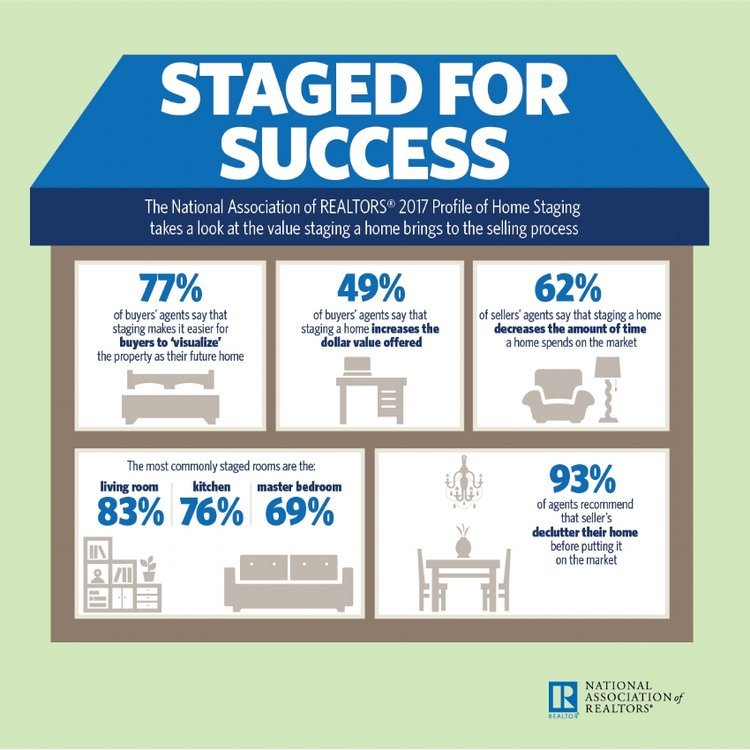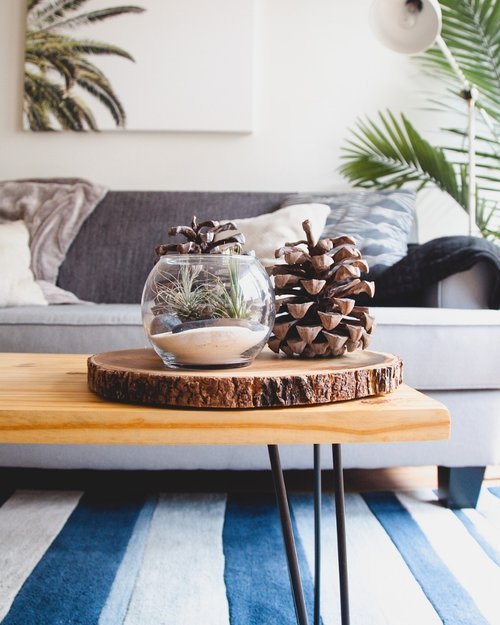Professional Home Staging: Is There a Real Benefit?
The next time you're looking at a staged home, try to "magic eye" your way to seeing beyond the generic yet appealing decor. (Do you remember when these were all the rage?? I miss the 90's!)
The National Association of Realtors (NAR) recently released a "report" that home staging decreases the time that a home spends on the market. This report consists entirely of a survey of Realtors.
62% of Realtors say that staging a home makes it sell faster.
That seems like a lot of Realtors agree!
But consider that 2 responses were added together to reach 62%: Only 39% said that staging greatly reduces time on market. The other 23% said it only slightly decreases the time on market.
While I appreciate that they included information about how the survey was done, the number of responses, and the confidence level of the results... this all boils down to nothing more than an opinion piece. Which doesn't really tell us much about whether or not staging makes a difference to time on market. And it tells us absolutely nothing at all about whether or not staging makes a home sell for more money.
But take a look at the cute infographic anyway.
Insert cute infographic here.
There's no real way to pull statistical data about the effectiveness of home staging. Listing agents don't indicate on the MLS whether or not the home was staged, so to determine the effectiveness of staging, a tightly controlled study is needed.
If a real-world study were put together, there would be a lot of variables to consider, such as:
Was every room in the home staged?
If not, were the other rooms left empty or did the homeowner leave their possessions?
Was the staging done completely by a stager or was it a mix of homeowner and staged items?
Was the home on the market before it was staged and, if so, was it furnished or vacant?
If the home was on the market before it was staged, was there a price drop?
If there was a price drop, was it before or after staging was added (or removed)?
Did the homeowner hire a professional staging company or was the staging provided by the Realtor?
What price is the home relative to the average for the area?
Is the home located in a city where staging is very common and expected by buyers?
And so on... you get the idea.
YAY FOR SCIENCE!
There was one scientific study published in The Journal of Housing Research titled "The Impact of Staging Conditions on Residential Real Estate Demand". Here is the excerpt:
This study is the first to examine the widely debated merits of staging a home for sale. We find that both homeowners and real estate agents believe staging conditions (furnishings and wall color) will significantly impact homeowners’ willingness to pay for a property. Our results show that homeowners rationally do not significantly differ in their valuations based on staging conditions. However, staging conditions do influence the process, as we find a neutral wall color and good furnishings do significantly influence a buyer’s perceived livability and overall opinion of the home. While these are a necessary condition for purchase, staging is not enough to result in a higher selling price.
— Mark A. Lane, Michael J. Seiler, and Vicky L. Seiler (2015) The Impact of Staging Conditions on Residential Real Estate Demand. Journal of Housing Research: 2015, Vol. 24, No. 1, pp. 21-36.
This study involved 800 buyers that were presented with virtual home tours and then asked what they would offer for the home. They saw homes that were vacant, decorated with "ugly" furnishings/colors, and staged with "upscale" items. The perceived value did not differ significantly between the three.
One of the authors of the study, Michael Seiler, did feel that staging could reduce time on market, which could result in a monetary benefit if "time is money". But this is still an opinion.
WHY ARE PEOPLE SO INTO STAGING?
A rug, a modern table, a glass item of some sort, a generic picture on the wall, and a neutral couch. Yep, it's staged!
The vast majority of people spend time searching for houses online. Which means the first impression they have of your home will nearly always be through pictures.
And this ain't the 90's. Computers, laptops, tablets, and mobile phones all have (increasingly) large screens with excellent resolution. That means buyers are more likely to see detail that would not have been discernible even a decade ago.
Read 21 Staging Tips from Houzz
Staging can help catch buyers attention online so that they decide to take a look in real life.
It's important to remember that good staging isn't in place to cover problems, it's to highlight the features.
Staging helps to re-focus attention on the positive (both online and in person). Staging can stop potential negative concerns before buyers have a chance to even think of them.
For example, if a room has odd angles, people will have negative thoughts regarding how to use the space. Good staging can show it off to advantage and keep people from worrying about furnishings.
Or a room with seemingly no purpose in an odd area can suddenly become the perfect place for a flat screen TV. Or library. Because people still buy books, right?
But what is a seller to do when they have a vacant home and prefer not to spend thousands of dollars to furnish it?
Virtual staging is the new option.
WAIT, VIRTUAL STAGING? IS THAT ETHICAL?
Virtually staging furniture is okay. Virtually staging a European city into the view... not so much.
Virtual staging utilizes software to add furnishings to your home pictures. Of course, software can also be used to change room color and other details, but that is unethical (and any Realtor that considers it is very, very dumb).
Let me immediately say here that, at least in Oregon, virtual staging must be disclosed. It's also suggested to provide photos of both the virtually staged rooms along with the same rooms without staging.
There are some strong negative opinions out there about virtual staging. Which tends to happen whenever new technology collides with existing practice.
I honestly don't see a lot wrong with the idea as long as the furniture added is proportional to the room. The argument against it is that it "dupes" the buyer. Well, that's kind of a ridiculous argument. We're talking about adding some furniture to the pictures, not doing crazy things like manipulating perspective, lighting, and details. Or covering up problems so that the buyer doesn't notice them!
Oh, wait, photographers and physical home stagers do all of those things, all the time. And very few people see a problem with it (though they should).
Both Realtors and the public expect photographers to take pictures of the home in it's best possible light, from the best angles, and focus away from weird details.
Most people will see online pictures and decide to take a look at the house. When they discover that the home doesn't show quite like it was presented online, buyers may grumble, but they're never surprised about it.
And yet, people suddenly have a big problem with some virtual furniture being added to a room. When you can easily go by the property and see it in it's unvarnished glory.
To me, that's even more fair to the buyer than using real staging. You get to see what it would look like filled with stuff and also see all the nicks and dings that real stuff would have covered up!
Why does every staged home have some form of wooden balls, usually in a glass bowl?
HERE'S WHAT I THINK ABOUT STAGING
It seems odd that 38% of Realtors in the NAR "study" say that they make sure all of their seller's homes are staged prior to listing. I find that hard to believe given that staging can run thousands of dollars a month, easily!
Whether or not staging can be beneficial is entirely situational.
A good Realtor will understand the market (and micro-markets) of the home. They will look into average days on market for similar, recently sold (and pending) homes. They will consider the price range the home will be in and whether or not similar homes on the market are staged. The Realtor will take into account how quickly the homeowner needs to sell, budgetary concerns, and style.
All of these things, along with an honest (and courteous) opinion of the homeowner's current furnishings, should factor into the Realtor's recommendation for staging.
Find a Realtor that you trust and take their opinion into account when making your decision on staging.
Personally, I think that if existing furnishings can be utilized, they should be. As long as you do what you can to make rooms more neutral, take family pictures out, and keep everything in top condition... this should work!
For vacant homes, it's always a good idea to think critically about the property and whether or not the cost will be worth it.
But, I'd love more studies to be done about staging! More hard data could be used to help calculate the potential ROI of staging. The difference it could make to home sellers, in terms of cold, hard cash, is huge!





